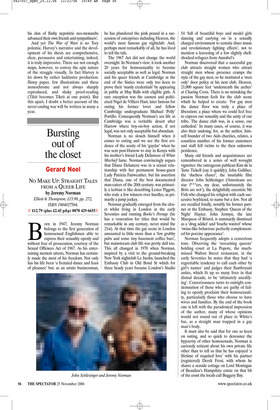Bursting out of the closet
Gerard Noel
NO MAKE UP: STRAIGHT TALES FROM A QUEER LIFE by Jeremy Norman Elliott & Thompson, £15.99, pp. 272, ISBN 1904027504, ✆ £12.79 (plus £2.45 p&p) 0870 429 6655✆ Born in 1947, Jeremy Norman belongs to the first generation of homosexual Englishmen able to express their sexuality openly and without fear of prosecution, courtesy of the Sexual Offences Act of 1967. As his entertaining memoir attests, Norman has certainly made the most of his freedom. Not only has his life been ‘a frenzied dance and feast of pleasure’ but, as an astute businessman, he has plundered the pink pound in a succession of enterprises including Heaven, the world’s most famous gay nightclub. And, perhaps most remarkably of all, he has lived to tell the tale.
The 1967 Act did not change the world overnight. In Norman’s view, it took another 20 years for homosexuality to become socially acceptable as well as legal. Norman and his queer friends at Cambridge at the end of the Sixties were only too keen to prove their ‘manly credentials’ by appearing in public at May Balls with eligible girls. A rare exception was the earnest and politicised Nigel de Villiers Hart, later famous for outing his former lover and fellow Cambridge undergraduate Michael ‘Polly’ Portillo. Consequently Norman’s sex life at Cambridge was a veritable desert after Harrow where boy-on-boy action, if not legal, was not only acceptable but abundant.
Norman is no slouch himself when it comes to outing and we see the first evidence of the acuity of his ‘gaydar’ when he was sent post-Harrow to stay in Kenya with his mother’s friend Lady Delamere of White Mischief fame. Norman convincingly argues that Diana Delamere was in a sexual relationship with her permanent house-guest Lady Patricia Fairweather, but his assertion that Diana, one of the best documented man-eaters of the 20th century, was primarily a lesbian is like describing Lester Piggott, who rode a few winners over hurdles, as primarily a jump jockey.
Norman gradually emerged from the closet whilst living in London in the early Seventies and running Burke’s Peerage (he has a veneration for titles that would be remarkable in any century, never mind the 21st). At that time the gay scene in London amounted to little more than a ‘few grubby pubs and some tiny basement coffee bars’, but mainstream club life was pretty dull too. This all changed in 1978 when Norman, inspired by a visit to the ground-breaking New York nightclub Le Jardin, launched the Embassy Club in Old Bond St which for three heady years became London’s Studio 54 ‘full of beautiful boys and model girls dancing and carrying on in a sexually charged environment to ecstatic disco music and revolutionary lighting effects’, not to mention a leavening of a few slightly shellshocked refugees from Annabel’s.
Norman discovered that a successful gay club attracts straight women who attract straight men whose presence cramps the style of the gay men, so he instituted a ‘men only’ door policy at his next club, Heaven, 21,000 square feet ‘underneath the arches’ at Charing Cross. There is no mistaking the passion Norman feels for the club scene which he helped to create: ‘For gay men the dance floor was truly a place of liberation; a place where we could feel free to express our sexuality and the unity of our tribe. The dance club was, in a sense, our cathedral.’ In many cases, of course, it was also their undoing, for, as the author, himself founder of two Aids charities, relates, a countless number of his former customers and staff fell victim to the then unknown pestilence.
Many old friends and acquaintances are remembered in a series of well wrought vignettes: the outrageous publican Kim de la Taste Tickell (say it quickly); John Galliher, the ‘duchess chaser’, the insatiable film director John Schlesinger (‘Americans are star f***ers, my dear, unfortunately the Brits are not’), the delightfully eccentric Mr Fish who changed his religion with each successive boyfriend, to name but a few. Not all are recalled fondly, notably his former partner at the Embassy, Stephen ‘Queen of the Night’ Hayter. John Jermyn, the late Marquess of Bristol, is summarily dismissed as a ‘drug addict’ and ‘louche wastrel’ whose ‘swine-like behaviour perfectly complemented his porcine appearance’.
Norman frequently adopts a censorious tone. Observing the ‘screaming queens’ holding court at La Popote, the muchmissed Walton Street restaurant, in the early Seventies he notes that they had ‘a regrettable tendency to call each other by girl’s names’ and judges their flamboyant antics, which lit up so many lives in that dismal decade, to be ‘ultimately unedifying’. Censoriousness turns to outright condemnation of those who are guilty of failing to openly proclaim their homosexuality, particularly those who choose to have wives and families. By the end of the book one is left with the paradoxical impression of the author, many of whose opinions would not sound out of place in White’s bar, as a straight man trapped in a gay man’s body.
It must also be said that for one so keen on outing, and so quick to denounce the hypocrisy of other homosexuals, Norman is curiously reticent about his own private life other than to tell us that he has enjoyed ‘a lifetime of requited love’ with his partner (registered) Derek Frost, with whom he shares a seaside cottage on Lord Montague of Beaulieu’s Hampshire estate on that bit of the coast the locals call Buggery Bay.


























































































 Previous page
Previous page